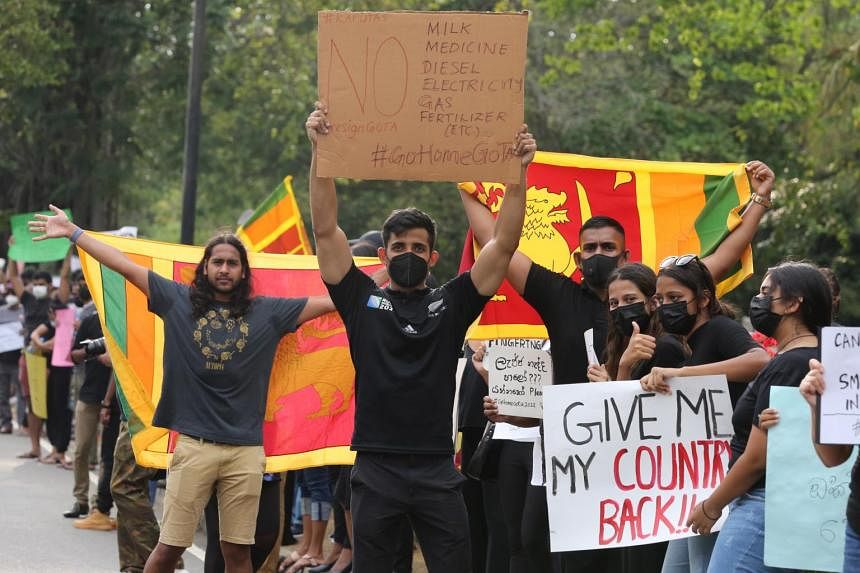SINGAPORE - Her anxiety grew with each passing day last week as Sri Lanka grappled with its worst economic crisis in decades.
Then Ms Damithri Deshani Munasinghe, 22, learnt in a phone call home that her 89-year-old grandfather could not replenish his medication for high blood pressure after running out.
Finding out on Monday (April 4) that her grandpa had managed to get more medication brought little relief to Ms Damithri. If anything, her fears for her family living in Colombo have grown, as violent protests raged in Sri Lanka's capital over the last few days.
The Sri Lankan economics undergraduate at the National University of Singapore told The Straits Times on Monday: "Back home, there is no electricity for at least five to seven hours a day. The queues for cooking gas are so long my family now cooks using firewood.
"I can't even imagine what it's like for the poor people who are dying of hunger and exhaustion."
Mired in its worst economic crisis since its independence in 1948, Sri Lanka is struggling to secure a host of essential items including food, medicine and fuel as prices of basic goods skyrocket.
Last Thursday, the protests turned violent as bricks were thrown and fires started outside embattled President Gotabaya Rajapaksa's private residence, with the police using tear gas and water cannons to disperse the protesters.
It has also become tougher for Sri Lankans to stay in touch, as the authorities clamped down by blocking popular social media platforms like WhatsApp.
Ms Damithri, who came to Singapore in 2019, said recent restrictions by the government have also made it more difficult for her parents to send her money for hostel fees and other expenses.
"My mother can send me only a specific amount of money per week or month," she said.
Dr Lahiru Wijedasa, a Singaporean with family in Sri Lanka, is concerned for the safety of his two young nieces. The 11- and 15-year-old daughters of his sister were just 300m from a protest in Colombo that saw tear gas being fired.
"It's a tinderbox," Dr Lahiru, 39, said. "The minute you have a highly tense situation, all you need is just one person to make a mistake and there can be retaliation."
Sri Lanka has a history of strife, including the bombing of churches and hotels on Easter Sunday in 2019 and a civil war that ended in 2009. Dr Lahiru said the current violence is something that many people in the country had hoped would never happen again.
The conservation biologist added: "You would think that in this day and age, we wouldn't have this. What effect will this have on the kids because they would have seen a whole nation coming to its knees?"
His parents, who are in relative safety in the city of Kandy, are due to fly to Singapore this week to visit him, but Dr Lahiru is concerned whether there will be enough fuel for them to travel to the airport.
Mr Hosney Fathah, 58, experienced the ongoing crisis first-hand when he was in Sri Lanka from March 12 to 20 to visit family. His wife's parents had died during the pandemic and they were unable to attend their funerals because of travel restrictions.
The Singaporean entrepreneur said of the recent trip: "We had a tough time getting about. Auto rickshaw riders doubled their prices because of a shortage of petrol. We also felt it was unfair to ask our relatives to drive us around."
While staying with his brother, he was caught in several power outages and they had to resort to candles.
Since his return to Singapore, Mr Hosney has been in touch with his family who have shared their growing frustrations at the shortages they are facing.
He has sent money to his brother to purchase dry rations like rice and wheat flour to be distributed to less-fortunate people in the area.

Mr Hosney also rehired his Sri Lankan domestic worker after she called his wife a few weeks ago. She had left on amicable terms a few years ago but was now looking for work to support her family. Her husband who runs a car workshop has been affected due to the petrol crisis.
"We thought it would be a good decision to hire her because her salary could help her feed so many people," said Mr Hosney.
Sri Lankan Nuwan Bandara, 44, who owns a Sri Lankan restaurant and grocery store in Little India, said he was hoping to return home later this month with his wife and their five-year-old son to visit family but had to cancel their plans due to the crisis.

The grocery store business has been affected, as some supplies come from Sri Lanka and prices have gone up by 25 to 30 per cent. But they remain committed to doing what they can to serve the community.
Mr Nuwan said: "We are trying our best and doing everything we can to give Sri Lankans here a taste of home, so that even if they cannot go to Sri Lanka, at least they can taste the food."
Meanwhile, Ms Damithri cannot wait to see her parents again if and when calm is restored in Colombo.
She said: "Honestly, a part of me feels so guilty. I have electricity, water, food and I'm doing all right here. But everyone back home is suffering terribly."


